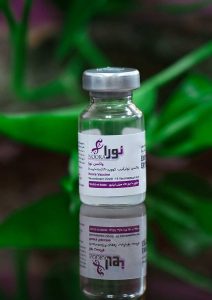
Following criticism from scientists around the world, a virology journal has retracted a paper describing the first test in humans of an Iran-made vaccine against COVID-19.
Iran licensed the home-grown Noora vaccine for emergency use in 2022 and has reportedly administered millions of doses to its citizens. The country’s health authorities say the shot is 94% effective.
The now-retracted paper, published in 2022 in the Journal of Medical Virology, was the only report on the clinical development of the vaccine to have appeared in an international journal. The article has been cited 10 times, according to Clarivate’s Web of Science.
In a commentary last year in the same journal, Donald Forthal, chief of infectious diseases at the University of California, Irvine, raised several concerns about the article, titled “Safety and immunogenicity of a recombinant receptor-binding domain-based protein subunit vaccine (Noora vaccine™) against COVID-19 in adults: A randomized, double-blind, placebo-controlled, Phase 1 trial.”
As we reported in October, Forthal questioned the efficacy of the vaccine and expressed surprise “a manuscript containing so many serious flaws would have been accepted for publication following peer review, and given these issues, a retraction may be in order.”
The journal’s editor-in-chief, Shou-Jiang Gao, said at the time the paper had undergone two rounds of “rigorously [sic] review by experts of the field” before it was published. The authors had responded to Forthal’s critique, Gao told us, and their response had “already undergone 3 rounds of review, each with 2 reviewers”:
The last decision was made on October 24, 2023 and deadline for submitting the revision is November 23, 2023. So, we are waiting for the authors to submit the last revision before accepting and publishing it. This should fully address the issues that are raised.
But the response was never published. Meanwhile, in January, Gideon Meyerowitz-Katz, an epidemiologist in Australia, flagged additional problems in the paper on PubPeer, including several “impossible” and “contradictory” numbers.
On March 2, the journal announced the paper had been retracted, stating:
The retraction has been agreed due to concerns raised by third parties regarding issues with the data presented in the article. Several inconsistencies concerning the information provided about the analyzed subjects were additionally identified. Furthermore, the authors failed to disclose the presence of potential conflicts of interest that may have affected the interpretation of the results presented. Accordingly, the editors consider the conclusions of this manuscript to be invalid. The authors have been informed of the decision to retract but did not agree with it.
Corresponding author Hassan Abolghasemi of Baqiyatallah University of Medical Sciences, in Tehran, told us by email:
Retraction of our article was a political decision not a scientific decision because there was a pressure on journal based on [apartheid] scientific issue. Our response to the comment never accepted by [PubPeer] and journal to be published.
Two days after the retraction, another group of researchers published a study in mice comparing the effect of four COVID-19 vaccines used in Iran.
“Our results indicate significant immunogenicity and neutralization efficacy induced by PastoCovac Plus and Sinopharm, but not by Noora and SpikoGen,” the team wrote in the article, which cited the now-retracted paper. “This suggests the need for additional comparative assessment of the potency and efficacy of these four vaccines in vaccinated subjects.”
Like Retraction Watch? You can make a tax-deductible contribution to support our work, subscribe to our free daily digest or paid weekly update, follow us on Twitter, like us on Facebook, or add us to your RSS reader. If you find a retraction that’s not in The Retraction Watch Database, you can let us know here. For comments or feedback, email us at [email protected].
I thought this article was really interesting. After completing the assignment on authors breaching conditions of scientific articles and then seeing a case where it actually happened seems fascinating. I cannot fathom releasing a paper like this, especially on a subject like COVID. I am glad that Forthdal found the article to be odd otherwise this vaccine could still be used. I also thought it was interesting how a study was published after the retraction that actually tested the vaccines from Iran which cleared the political reasoning accusation. Overall, this was a cool article to read and I am glad I could see the process of how it was handled.